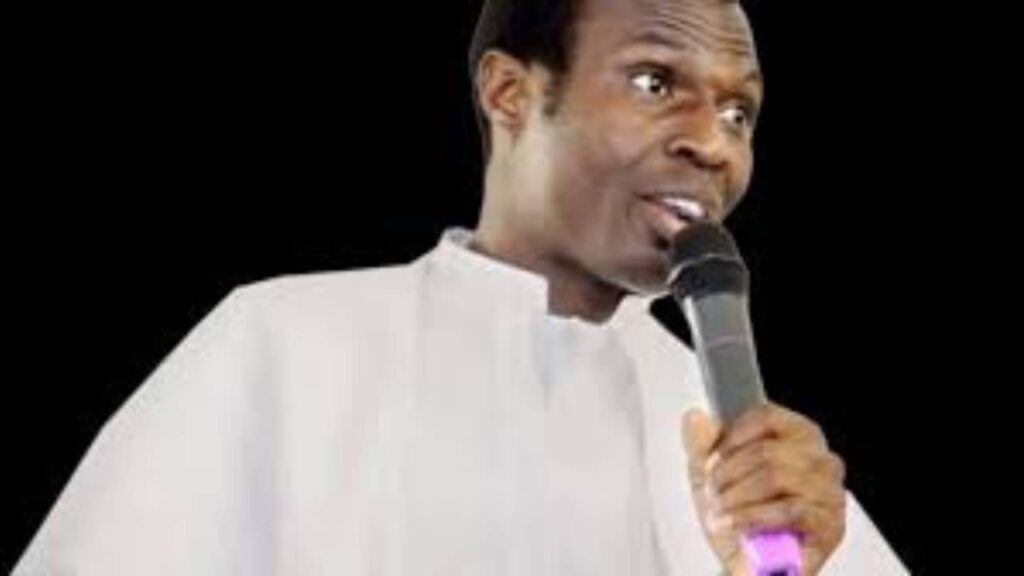
A Nigerian prophet, Sam Olu Alo has charged South-West leaders to tell President Bola Ahmed Tinubu the “hard truth” about the current hardship being faced by Nigerians.
Prophet Sam Olu Alo of the Christ Apostolic Church (CAC) Adamimogo Grace of Mercy Prayer Mountain Worldwide, urged all South-West stakeholders to speak up to avert crises, particularly during this era of economic challenges.
Speaking on a radio program on Adamimogo FM, the cleric said all stakeholders in Yorubaland, including Christian and Muslim bodies, as well as those with direct access to the president, should meet with him and let him know what Nigerians are going through.
He said: “The Ooni of Ife should convene a meeting with all Obas in the South-West and choose a delegation to meet Tinubu at Aso Rock.
“CAN President Pastor Samuel Oladele, Pastor Adeboye of RCCG, and other respected men of God should also lead a delegation of clerics to meet President Tinubu in Abuja to express how deeply Nigerians are suffering.”
According to Alo, President Tinubu is not a wicked person, but he has a listening ear to heed advice and take necessary steps to provide solutions to the problems.
He stated that President Tinubu needs prayers because it seems some past Nigerian leaders, who had good intentions, failed to achieve them once they entered Aso Rock.
Alo recalled that President Tinubu had once assured Nigerians to be patient, saying that relief was on the way, but it seems the promise is yet to be fulfilled.
The cleric called for a change in the leadership of the Nigerian National Petroleum Company (NNPC) Limited, stating that for Tinubu to succeed and for Nigerians to be content with his administration, there is a need to either reform the state-owned oil company or scrap it entirely as it is one of the root causes of Nigeria’s problems.
“There has been no word of encouragement from NNPC since the announcement of the fuel price increase,” Alo said.
“Nigeria is the most prayerful nation in Africa, yet hardship persists. Let’s prioritize love over prayers. By doing this, all will be well for our nation. No amount of prayer will change the nation unless the necessary steps are taken.
“This message is not meant to criticize Tinubu, traditional rulers, or religious leaders; it’s simply advice. It’s up to them to either take it or leave it.
“Despite the economic hardship, Nigerians still support President Tinubu. Many graduates now regret going to school because those who didn’t attend are doing better than them.
“Farm produce is rotting in some areas due to a lack of good roads for transporting the products.
“Regarding the minimum wage, I once prophesied to Nigerian workers that even if N500,000 is given as the minimum wage, it still won’t be enough.
“There is no amount of minimum wage that will bring relief to workers. What they should focus on is how the prices of goods and services can be reduced to the barest minimum.”
He, however, urged Nigerians to be patient and give Tinubu time to address the issues, stating that protests or agitation are not the best solutions to the current challenges.
Nigeria is facing its worst economic crisis in decades, with skyrocketing inflation, a national currency in free-fall and millions of people struggling to buy food. Only two years ago Africa’s biggest economy, Nigeria is projected to drop to fourth place this year.
The pain is widespread. Unions strike to protest salaries of around $20 a month. People die in stampedes, desperate for free sacks of rice. Hospitals are overrun with women wracked by spasms from calcium deficiencies.
Although President Bola Tinubu increased the minimum wage — after strike action and months-long negotiations with labour unions — from N30,000 to N70,000, his government has increased spending for officials at a time of nationwide starvation.
For workers earning the new N70,000, or $43, per month minimum wage, capricious inflation and naira value have inflicted too much damage for the changes to make any difference in their lives.
The crisis is largely believed to be rooted in two major changes implemented by Mr Tinubu, elected 14 months ago: the partial removal of fuel subsidies and the floating of the currency, which together have caused major price rises.
A nation of entrepreneurs, Nigeria’s more than 200 million citizens are skilled at managing in tough circumstances, without the services states usually provide. They generate their own electricity and source their own water. They take up arms and defend their communities when the armed forces cannot. They negotiate with armed kidnappers when family members are abducted.
But right now, their resourcefulness is being stretched to the limit.
Prices of petrol tripled since the removal of subsidy in May 2023, from around ₦200/litre to about ₦1000/litre, compounding the woes of the citizens who power their vehicles, and generating sets with petrol, no thanks to decades-long epileptic electricity supply.
Amid a lingering fuel scarcity and crisis, petrol is being sold for ₦855 per litre at state-owned petroleum company, NNPCL, cementing claims that the price has been reviewed upward to reflect the nation’s current foreign exchange woes and fuel landing cost hassles.
In recent weeks, the nation has suffered an acute fuel scarcity that led the few stations with fuel to sell at exorbitant prices above N1,000 per litre while black market prices exceeded N1,200.
In August, Amnesty International accused Nigerian security forces of killing at least 21 protesters during a week of economic hardship protests.
Police and other security agencies clamped down on protests after thousands of people joined rallies against government policies and the high cost of living from August 1st to 10th.
Security forces denied responsibility for deaths during the protests.
